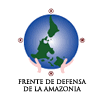Chevron Deceiving U.S. Government to Protect Ill-Gotten Profits in Ecuador, Indigenous Groups Say
Chevron Lobbyists Misleading USTR Over Ecuador Environmental Case

Amazon Defense Coalition
23 April 2009 - FOR IMMEDIATE RELEASE
Contact: Karen Hinton at +1.703.798.3109
Washington, D.C. (April 23, 2009) - A team of prominent Chevron lobbyists are again misleading the U.S. Trade Representative as part of a campaign to retaliate against Ecuador's government for refusing to interfere in a private environmental lawsuit against the oil giant, representatives of Amazonian communities say.
The controversy concerns a petition recently submitted by Chevron to Ron Kirk, the newly confirmed USTR ambassador and former Mayor of Dallas, asking that trade preferences for Ecuador be canceled because Ecuador's President has not quashed a private class action lawsuit brought by 30,000 rainforest residents in Ecuador's courts. The 15-year-old case, which was transferred to Ecuador from U.S. federal court in 2002 at Chevron's request, is expected to conclude this year with a multi-billion dollar judgment against the oil giant.
A loss of trade preferences for Ecuador would cost the country 350,000 jobs in a country with a total population of 12 million, according to Ecuador's government.
A court-appointed team of technical experts in Ecuador recently assessed damages against Chevron at up to $27 billion, a possible record for an environmental case. Chevron is accused of dumping billions of gallons of toxic waste into Amazon waterways over a 26-year period, leading to a dramatic increase in cancer, decimating indigenous groups, and despoiling an area of ecosystem the size of Rhode Island.
Chevron's USTR lobbying campaign is "based on misrepresentations, is an affront to the rule of law in two countries, and is a continuation of a decades-long abuse of the people of Ecuador," said a letter sent to Kirk by Ecuadorian advocates for dozens of communities and indigenous groups. Similar campaigns by Chevron to cancel Ecuador's trade preferences failed in 2006 and 2008.
The Amazonian representatives asked Kirk to refer Chevron's petition to authorities to determine if the company is making false statements to the executive branch in violation of federal law.
"Chevron is asking the U.S. government to pressure Ecuador's President to interfere with his country's independent judiciary to quash a private legal case," said Steven Donziger, an American legal advisor to the plaintiffs. "Such action would violate Ecuador's Constitution and result in an impeachable offense for Ecuador's President.
"This is a classic example of a large oil company trying to manipulate the U.S. government's foreign policy to protect its own ill-gotten profits in Ecuador," said Donziger.
The letter pointed to two primary "misrepresentations" by Chevron to the USTR:
- Chevron claims it was released by Ecuador's government in 1995 from any clean-up obligations. In reality, the express language of the "release" does not cover claims brought by private individuals against the company. No court in the U.S. or Ecuador has ever accepted Chevron's claims about the scope of the release.
- Chevron claims it "remediated" the environmental damage in the mid-1990s despite the fact a team of court experts found the remediation was at best ineffective, and at worst a fraud. Two Chevron lawyers and seven former Ecuadorian government officials are under indictment for lying about the remediation results.
"Chevron's submission to the USTR is a key component of its lobbying and political campaign to intervene in, and undermine, a pending legal matter in Ecuador," according to the letter sent to Kirk. "We ask your office to reject this effort by Chevron as an inappropriate attack on the rule of law."
Chevron spent $6.8 million lobbying in Washington in the first quarter of the year - more than any other company in the country other than Exxon.
Chevron's high-powered lobbyists on the issue include Mack McLarty, former chief of staff to President Bill Clinton; former Senators John Breaux and Trent Lott; Wayne Berman, who served as the national finance chair for Sen. John McCain's presidential campaign; and several members of the company's government relations staff in Washington.
Several months ago, a Chevron lobbyist created a major stir by being quoted anonymously in Newsweek as saying, in regard to Chevron's potential environmental liability in Ecuador: "We can't let little countries screw around with big companies like this - companies that have made big investments around the world."
#